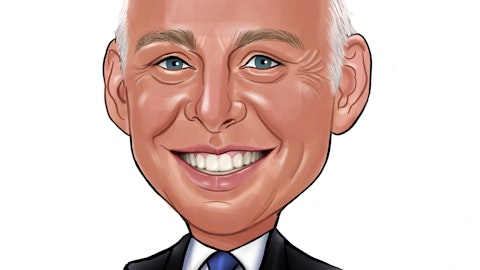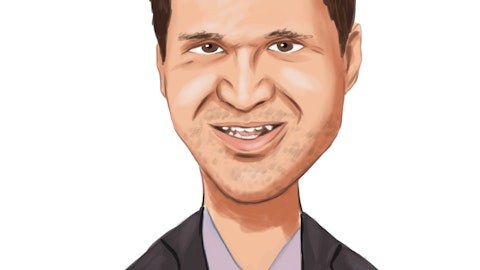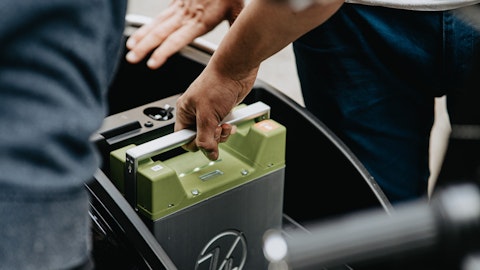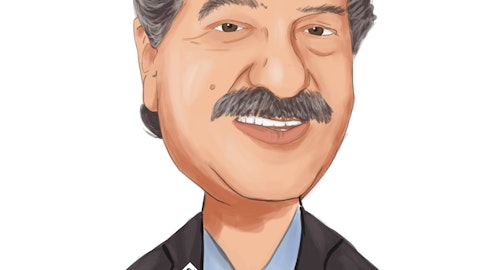Jeffrey Glajch: Yes, Laurence, one additional thing we could also look as we will to some extent in 2023 is reducing our debt a little bit too.
Laurence Alexander: Yes, excellent.
Corning Painter: That — if nothing else that allows you that dry powder in the future also.
Laurence Alexander: Okay, great. Okay. Thank you.
Corning Painter: Thank you.
Operator: Thank you. Our next question is coming from the line of Jon Tanwanteng with CJS Securities. Please proceed with your questions.
Jon Tanwanteng: Hi. Thanks for taking my questions and really nice quarter and outlook here. My first one is what really changed in the SCB market compared to when you last reported, I think the outlook? When you gave that — when you do report the Q3, it was fairly uncertain or even dire maybe. So what came in that wasn’t expected? And then as you look forward, is that a continuation of the same strength? Or is it different contracts that you’re looking at? Or maybe just an upgrade in the macro outlook that you’re thinking? Help us understand the delta there?
Corning Painter: Sure. I’d say really two things. Number one, specialty volume, particularly the premium volume held up well and better than we expected. Number two, the whole EU power cost versus natural gas costs, that balance was better than we expected. And from our perspective, we look now into the coming year, I do not think we’re going to receive a repeat of last year, I think the natural gas prices were kind of artificially pumped up by the almost mechanical buying some of these nations to build their storage facilities. So we see the energy markets being a bit more stable in Europe going forward for the coming year. But it was really those two things came in a bit more favorable than we had anticipated.
Jon Tanwanteng: Okay, great. Thank you. And then just looking at the cash flow for next year, it looks like you’re getting a fair chunk from working capital releases, which is really nice to see. I was just wondering how much of that is just the natural swings and movements in flow and energy prices versus some kind of permanent reduction in working capital needs, your new contracts or some other thing that’s going on? What should we expect going forward?
Corning Painter: Sure, Jon. I think the numbers for 2023 are primarily a permanent reduction in around the terms particularly our rubber contracts. We talked about that a little bit last quarter that along with pricing we were able to negotiate better terms. And that’s really where that reduction is coming in, you will see if you look, in the fourth quarter, we saw a reduction in working capital in the quarter, a pretty strong one and that was related to oil prices coming down in the fourth quarter. But 2023 it’s really focused on the permanent reduction in — from our customers — our customer contracts.
Jeffrey Glajch: And I think one thing that’s notable in that is we’ve moved up the pricing significantly, which would normally increase your working capital in this sense in terms of the AR, and it just shows the importance of improving these contract terms.
Jon Tanwanteng: Got it. Thank you. And then finally, just maybe just to rehash the capital allocation question, I mean, $100 million in free cash flow even after investing in all the growth you want to do. You have a repurchase plan, which won’t cover all of it. Are there any other high return options that you’re looking at, specifically in terms of either repurchases or organic projects that, that may be starting to look interesting to just help us understand what that may eventually be used for, even if you don’t spend it this year ’24, ’25 and beyond?
Jeffrey Glajch: Well, Jon, I’d like to convey a sense of being a good steward of this cash. So we’re not acting like it’s burning a hole in our pocket. The easiest outcome for all this and a good outcome for us would be what just added to that last comment would just be reducing our debt ratio. And that’s a fine way to take some of that. We will later in this year, as we come towards the conclusion of our first share purchase, decide if we want to do more on that, we might green light some other projects, we have other high return projects, large and small. We’ll kind of see at that time. And I think deferring that to see what our business conditions, what’s most attractive at the time is, is a positive for us. But at the worst, we simply reduce our debt ratio, which for Orion would be a fine thing to do right now. So we really don’t have like a pressing need, we have to move that one way or the other right now. Let’s be careful.





